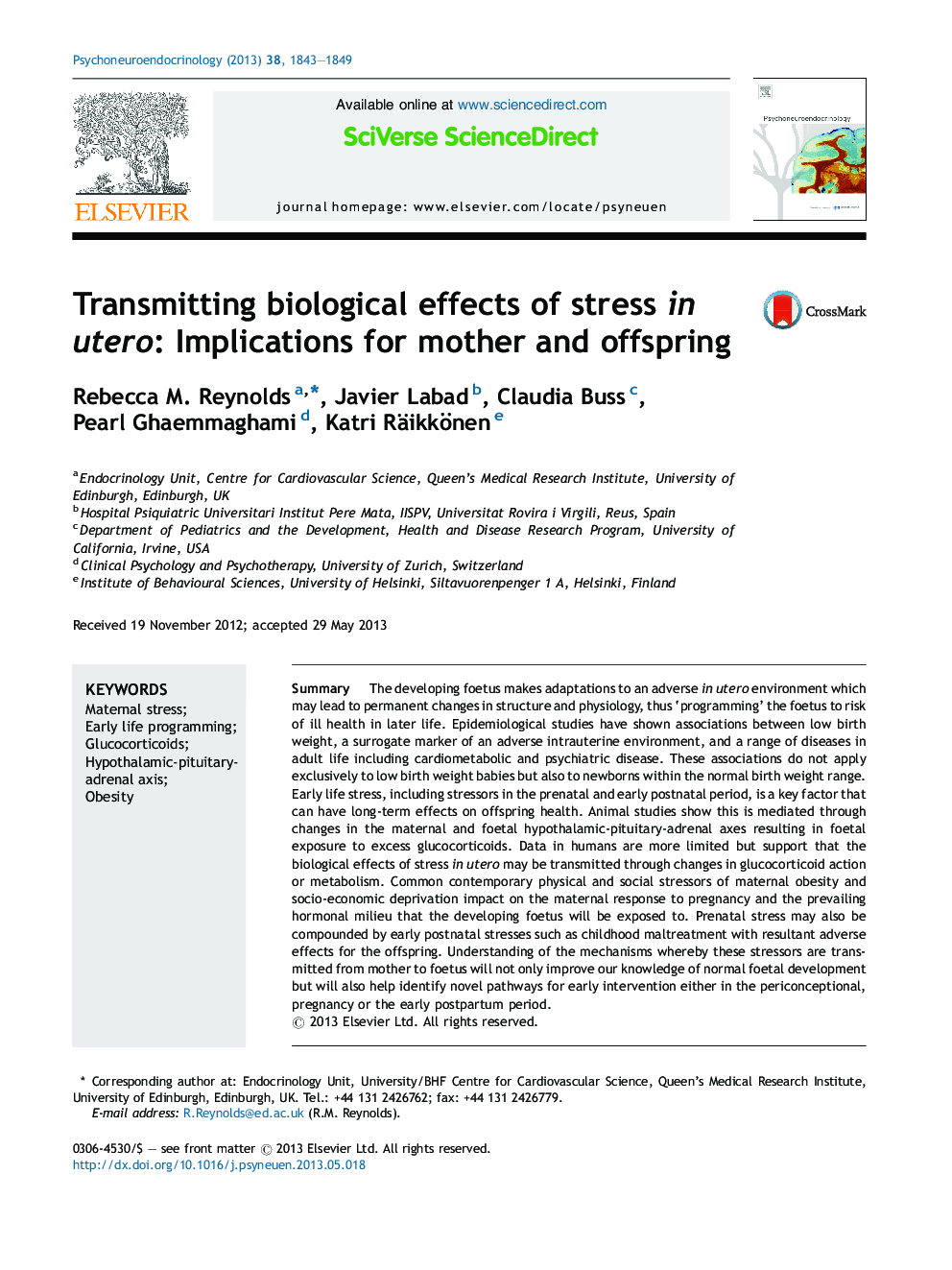| کد مقاله | کد نشریه | سال انتشار | مقاله انگلیسی | نسخه تمام متن |
|---|---|---|---|---|
| 10306109 | 547123 | 2013 | 7 صفحه PDF | دانلود رایگان |
عنوان انگلیسی مقاله ISI
Transmitting biological effects of stress in utero: Implications for mother and offspring
ترجمه فارسی عنوان
انتقال اثرات بیولوژیکی تنش در رحم: پیامدهای مادر و فرزندان
دانلود مقاله + سفارش ترجمه
دانلود مقاله ISI انگلیسی
رایگان برای ایرانیان
کلمات کلیدی
استرس مادران، برنامه ریزی اولیه، گلوکوکورتیکوئیدها، محور هیپوتالاموس-هیپوفیو-آدرنال، چاقی،
ترجمه چکیده
جنین در حال توسعه سازگاری با محیط زیست محیطی دارد که ممکن است منجر به تغییر دائمی در ساختار و فیزیولوژی شود و در نتیجه برنامه ریزی جنین را در معرض خطر ابتلا به بیماری های سالم قرار می دهد. مطالعات اپیدمیولوژیک ارتباط بین وزن کم هنگام تولد، نشانگر جایگزین یک محیط زیستی داخل رحمی و انواع بیماریهایی در زندگی بزرگسالان از جمله بیماری قلبی و متابولیکی روانی نشان داده است. این انجمن ها به طور انحصاری برای نوزادان کم وزن هنگام تولد و همچنین نوزادان در محدوده وزن طبیعی وزن طبیعی اعمال نمی شود. استرس زودهنگام، از جمله عوامل استرس زا در دوره پس از زایمان قبل و بعد از زایمان، یک عامل کلیدی است که می تواند اثرات طولانی مدت بر سلامت فرزندان داشته باشد. مطالعات حیوانی نشان می دهد که این امر به واسطه تغییرات محور هیپوتالاموس-هیپوفیز-آدرنال مادر و جنین منجر به قرار گرفتن در معرض جنین به اضافه گلوکوکورتیکوئید می شود. داده های موجود در انسان محدودتر هستند، اما حمایت از اثرات بیولوژیکی استرس در رحم ممکن است از طریق تغییرات در فعالیت گلوکوکورتیکوئیدی یا متابولیسم منتقل شود. فشار روانی فیزیکی و اجتماعی مشترک معاصر چاقی مادران و محرومیت اجتماعی و اقتصادی بر پاسخ مادران به حاملگی و محیط غالب هورمونی تاثیر می گذارد که جنین در معرض آن قرار می گیرد. استرس پس از زایمان ممکن است با تنش های اولیه پس از زایمان مانند خستگی دوران کودکی همراه با اثرات جانبی ناگوار برای فرزندان همراه شود. درک مکانیسم هایی که این عوامل استرس زا از مادر به جنین انتقال می یابند، نه تنها دانش ما را در مورد رشد جنین طبیعی بهبود می بخشد، بلکه به شناسایی راه های جدید برای مداخله زودهنگام یا در دوره حاملگی، در دوران بارداری و یا در دوران پس از زایمان کمک می کند.
موضوعات مرتبط
علوم زیستی و بیوفناوری
بیوشیمی، ژنتیک و زیست شناسی مولکولی
علوم غدد
چکیده انگلیسی
The developing foetus makes adaptations to an adverse in utero environment which may lead to permanent changes in structure and physiology, thus 'programming' the foetus to risk of ill health in later life. Epidemiological studies have shown associations between low birth weight, a surrogate marker of an adverse intrauterine environment, and a range of diseases in adult life including cardiometabolic and psychiatric disease. These associations do not apply exclusively to low birth weight babies but also to newborns within the normal birth weight range. Early life stress, including stressors in the prenatal and early postnatal period, is a key factor that can have long-term effects on offspring health. Animal studies show this is mediated through changes in the maternal and foetal hypothalamic-pituitary-adrenal axes resulting in foetal exposure to excess glucocorticoids. Data in humans are more limited but support that the biological effects of stress in utero may be transmitted through changes in glucocorticoid action or metabolism. Common contemporary physical and social stressors of maternal obesity and socio-economic deprivation impact on the maternal response to pregnancy and the prevailing hormonal milieu that the developing foetus will be exposed to. Prenatal stress may also be compounded by early postnatal stresses such as childhood maltreatment with resultant adverse effects for the offspring. Understanding of the mechanisms whereby these stressors are transmitted from mother to foetus will not only improve our knowledge of normal foetal development but will also help identify novel pathways for early intervention either in the periconceptional, pregnancy or the early postpartum period.
ناشر
Database: Elsevier - ScienceDirect (ساینس دایرکت)
Journal: Psychoneuroendocrinology - Volume 38, Issue 9, September 2013, Pages 1843-1849
Journal: Psychoneuroendocrinology - Volume 38, Issue 9, September 2013, Pages 1843-1849
نویسندگان
Rebecca M. Reynolds, Javier Labad, Claudia Buss, Pearl Ghaemmaghami, Katri Räikkönen,
